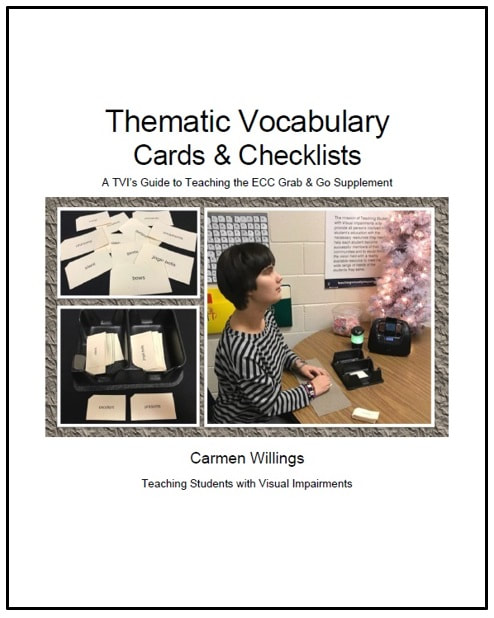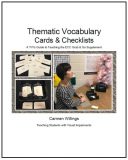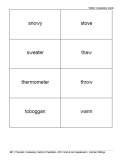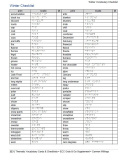- ECC Instructional Resources
- >
- Thematic Vocabulary Cards and Checklists: Grab & Go ECC Supplement
Thematic Vocabulary Cards and Checklists: Grab & Go ECC Supplement
The Thematic Vocabulary Cards and Checklists Grab and Go ECC supplement is a 446 page pdf downloadable print on demand workbook that includes 2940 vocabulary card on 3 1/2" x 2" templates divided by each of the 32 Thematic Units along with a checklist of each unit words in print and simulated braille. As a companion to the TVI's Guide to the ECC, the vocabulary cards correspond to the ECC Thematic activities presented in the curriculum guide.
Tips for Use
• Print a copy of this digital book.
• Copy the vocabulary cards on cardstock or Manila Braille Transcribing Paper available from the American Printing House for the Blind or other cardstock.
• It can be helpful to braille the cards prior to cutting them. If placing braille on the back of the card, however, it is easier to braille after cutting the cards out.
• When placing braille on the front of the card, center it below the print. This way teachers, peers, or caregivers can see the print while the student reads the braille.
• If brailling on both sides of the card, place braille below print on the front of the card and on the back, braille on the top of the card so as to not “smoosh” the braille on the opposite side.
• Cut out the cards and cut an angled notch in the top corner to assist students in properly orienting the card.
• If you are instructing a student that has residual vision, place the braille on the back or both sides of the vocabulary card. Encourage the student to read the word in braille and then flip the card over to check for accuracy.
• Copy the checklist that corresponds to the current unit of instruction.
• Use the checklists to document which vocabulary words have been introduced and student success.
• The simulated braille is UEB contracted braille andcan act as a reference for brailling on the cards.
• As the student writes or reads the words, use the opportunity to discuss ECC concepts and pare with ECC activities outlined in the TVI’s Guide to Teaching the ECC.
Additional Use:
Teachers of Students with Visual Impairments can have a extremely varied caseloads. It is possible to go several years without having a student on your caseload who requires braille instruction. Like other skills, if you do not practice your braille regularly, it is easy to lose those skills. Use these checklists and cards to maintain your braille skills. Fold the checklist along the line dividing the print from the braille. Choose to either read the print and produce the word in braille using a braillewriter or read the simulated braille and decode it. Finally, these vocabulary cards and checklists may be used with family members or peers who are interested in learning and practicing the braille code.
Note:
This resource book is a digital pdf download. Once you make your purchase you will be directed to an order confirmation page. The download will be included on the receipt sent to the email address you provide. The pdf download can be found directly under the order number.
*Single Instructor Use but may be copied for use with as many students on instructor's caseload
Product details:
Digital pdf download: 446-page print on demand resource
Publisher: Teaching Students with Visual Impairments
Author: Carmen Willings
Language: English
*Please contact me if you need to purchase using a purchase order. I am happy to help guide you in the process of adding Teaching Students with Visual Impairments as an approved vendor for your school or program or you can visit the product support page for information on using a PO.




